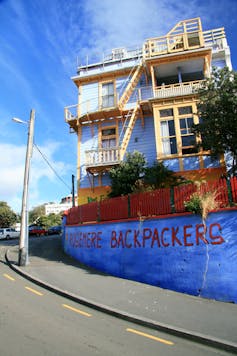A green tax on long-haul flights favours rich tourists. NZ needs a fairer strategy
- Written by Michael Lueck, Professor of Tourism, Auckland University of Technology
International tourism has clearly been hit hard by COVID-19. But despite the desperation of the travel and airline industries, people are already questioning[1] whether it should ever return to pre-pandemic levels.
One who thinks not is Air New Zealand’s chief environmental adviser, Sir Jonathon Porritt. Increasing the price of long-haul flights to pay for greenhouse gas emissions, he said recently[2], would help end “thoughtless, heedless” tourism.
Porritt was responding to the latest report from Parliamentary Commissioner for the Environment Simon Upton. Titled “Not 100% – but four steps closer to sustainable tourism[3]”, one of its four main recommendations was for the introduction of a departure tax to offset the carbon emissions from international air travel.
At the same time, the tourism minister was calling for[4] New Zealand to concentrate on “high-value” visitors and to reduce the industry’s reliance on backpackers and freedom campers.
All of which raises a key question: what is the best way to factor in the cost of emissions while encouraging the preferred kind of tourism?
Targeting ‘high-value’ tourists not the answer
Upton proposed a distance-based departure tax, ranging from NZ$25 for an economy flight to Australia, to $155 for an economy flight to the United Kingdom.
It is estimated such a tax would raise around $400 million each year. This could then be used to fund environmental and climate change projects and infrastructure.
 Backpackers stay longer and support local businesses.
www.shutterstock.com
Backpackers stay longer and support local businesses.
www.shutterstock.com
These proposals certainly have potential. But targeting a certain type of “high-value” traveller is unrealistic, and basing a tax solely on the distance travelled is not the best way forward.
Backpackers may spend less per day, but they commonly spend more overall because they stay longer. They also tend to spend more with local businesses, rather than on the products and services of large international corporations.
As such, backpackers can be of more value to the country than high-end, short-stay visitors. There is also evidence[5] these lower-budget travellers are valuable word-of-mouth ambassadors who often return when they are older, booking upmarket accommodation, attractions and tours.
Tax based on length of stay
Rather than calculating a tax on distance alone, then, it would make more sense to add a length-of-stay component. This could be staggered: the longer the visit, the lower the departure tax.
Long-haul air travel produces vastly more emissions per passenger than other modes of travel such as train, bus or car. Due to Aotearoa New Zealand’s remoteness, the vast majority of international visitors (other than Australians) arrive on long-haul flights.
A much higher proportion of energy consumption and emissions is attributable to the flights to and from a destination like Aotearoa than to activity within the country. Spread across an entire holiday, the per-day consumption decreases as the length of stay increases.
Read more: NZ tourism can use the disruption of COVID-19 to drive sustainable change — and be more competitive[6]
A staggered tax would be relatively simple to calculate. Incoming temporary visitors need to hold a return ticket; open ticket and outbound one-way ticket holders could be charged a flat fee.
Given long-haul tourists have already paid relatively high airfares, a reasonable tax shouldn’t be a burden. If they know the money is targeted at environmental and climate change initiatives, they might even welcome it. The impact on demand will likely be negligible.
Sustainable tourism for everyone
New Zealand already charges a $35 per head international conservation and tourism levy (IVL[7]). It’s collected when a visitor applies for a visa or New Zealand Electronic Travel Authority (NZeTA).
While the IVL does not apply to permanent residents and citizens, the proposed departure tax would. It would be a shame if visitors saw those charges as gouging[8], so it is important a departure tax and the IVL work in tandem and are charged together in a fair and transparent way.
Read more: Pacific tourism is desperate for a vaccine and travel freedoms, but the industry must learn from this crisis[9]
A combined IVL and departure tax, based on distance and length of stay, would create a much fairer system than charging based on distance alone.
This is especially important if we don’t want Aotearoa New Zealand to be perceived as a country for the rich only, rather than a destination that offers opportunities for all types of visitors.
But requiring those responsible for the highest per-day emissions to pay the highest price might help discourage some of the “thoughtless, heedless” tourism we have witnessed in the past.
References
- ^ questioning (www.academia.edu)
- ^ he said recently (www.newsroom.co.nz)
- ^ Not 100% – but four steps closer to sustainable tourism (www.pce.parliament.nz)
- ^ calling for (www.rnz.co.nz)
- ^ evidence (www.researchgate.net)
- ^ NZ tourism can use the disruption of COVID-19 to drive sustainable change — and be more competitive (theconversation.com)
- ^ IVL (www.mbie.govt.nz)
- ^ gouging (www.stuff.co.nz)
- ^ Pacific tourism is desperate for a vaccine and travel freedoms, but the industry must learn from this crisis (theconversation.com)
Authors: Michael Lueck, Professor of Tourism, Auckland University of Technology







